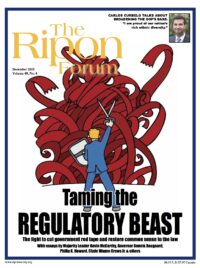With 19 percent of the American people saying they do not trust the federal government, it goes without saying that most Americans view Washington as a dysfunctional place. And yet when you look back at some of the things that have been accomplished over the past 12 months, you can argue that 2015 has actually been a fairly productive year.
Congress approved Trade Promotion Authority for the President this past summer, and, this fall, reached agreement on a debt and deficit plan that, among other things, included the first significant reform to Social Security in more than 30 years. More recently, the parties have come together to approve a long-term highway bill to rebuild America’s crumbling roads and rewrite the No Child Left Behind Act to give states more control over what our children learn in school. While none of these plans and agreements are perfect, they collectively represent the kind of common sense compromise that has been in short supply in our Nation’s capital in recent years.
In this latest edition of THE RIPON FORUM, we look at another area where common sense is too often lacking and compromise is sorely needed – overregulation. In his first Inaugural Address, Ronald Reagan famously stated that, “In this present crisis, government is not the solution to our problem; government is the problem.” But even Reagan knew that government has a role in our society. He understood that in addition to promising to make government smaller, Republicans also had an obligation to make sure government operated efficiently and effectively. “Now, so there will be no misunderstanding,” Reagan declared in this same address, “it is not my intention to do away with government. It is, rather, to make it work.”
If there were ever an area where government needed to work, it is in the area of regulations. From clean air to highway safety, government has a responsibility, in the words of Abraham Lincoln, to do for the people “whatever they need to have done, but cannot do, at all, or cannot, so well do, for themselves.” Unfortunately, that responsibility has grown over the years to include more areas than Lincoln likely would have ever imagined. In fact, as Clyde Wayne Crews of the Competitive Enterprise Institute points out in this edition of the FORUM, if the regulatory state in America were a country today, “it would be the 10th largest in the world.” What led to this growth? According to author and good government expert Philip K. Howard, the growth is due to a lack of proper oversight and good intentions gone astray. “American government today is run by dead people — past members of Congress who wrote all these statutes, and bureaucrats long gone who wrote the millions of words of regulations,” Howard writes. He goes on to argue that the federal government is broken not because these “past lawmakers were stupid, but because legislative programs almost never work out as planned.”
Fixing broken government is not just about economics, argues House Majority Leader Kevin McCarthy in this latest edition. It is also, he writes, “about holding government accountable, putting a stop to corruptive influences in Washington, and ending the proliferation of bad rules.” McCarthy goes on to note that the House of Representatives has passed legislation to tame the regulatory beast, and it remains one of the top priorities for Congressional Republicans in the coming year. As Republicans move ahead in this regard, they may want to look to the example set in South Dakota, where Governor Dennis Daugaard launched a “red tape review.” Daugaard writes that this review has “eliminated over 4,000 sections of law and regulations” and helped make South Dakota one of the top states in America to do business. Of course, the most important voice when it comes to the impact of overregulation does not belong to elected officials or academic experts. It belongs to the American people, which is why in this latest edition we have also included the voices of four small business owners around the country.
This latest edition of THE RIPON FORUM also includes an important essay by former House Appropriations Chairman Bob Livingston on the need for congressional reform, and a timely interview with former Congressman Mike Oxley on the career of his good friend and colleague, the recently-retired Speaker of the House, John Boehner. And in our latest Ripon Profile, we feature one of the rising stars of the Republican Party, Florida Congressman Carlos Curbelo, who, among other topics, discusses his first year in Congress and the need to broaden the GOP’s base.
As always, we hope you enjoy this edition of the FORUM, appreciate your readership this past year, and encourage you to contact us with any thoughts or comments you may have.
Lou Zickar
Editor of THE RIPON FORUM
louzickar@clu.ccw.mybluehost.me




